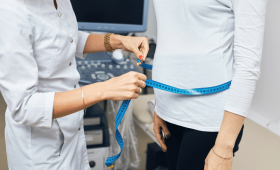How Much Weight Can I Lose With Mini Gastric Bypass Surgery?
Mini Gastric Bypass surgery is a highly effective bariatric procedure that generally allows patients to lose 60% to 80% of their excess weight. This process shows the fastest progress within the first 12 to 18 months following the surgery. The amount of weight loss depends on many factors, such as the initial body mass index (BMI), age, gender, and, most importantly, how strictly the patient adheres to the post-operative nutrition and exercise program. Supporting the surgery with new lifestyle habits is vital for a successful outcome, and weight loss even beyond this rate can be observed.
What Is The Average Amount Of Weight Lost In The First Year?
The first year after surgery is the most dynamic period for weight loss, and most patients aim to lose 50% to 75% of their excess weight during this time. This intense weight loss results from both the restriction of food intake due to the reduced size of the stomach and the decrease in nutrient absorption (malabsorption) by bypassing a portion of the small intestine. However, paying attention to adequate protein intake and vitamin supplements during this process is critical to prevent muscle mass loss and progress healthily. Regular follow-up appointments provide great support in achieving these goals.
When Does Weight Loss Start To Plateau And Why?
The rate of weight loss usually begins to slow down and eventually plateaus after the first 18 months following surgery. This occurs as the body starts to adapt to a new, lower weight and the metabolism stabilizes. Additionally, the mild stretching of the created stomach pouch over time and a patient’s relaxation in adhering to nutritional rules can also affect the pace. This period, known as the plateau phase, is normal, and maintaining physical activity and portion control is important for preserving long-term stability.
Is There A Possibility Of Regaining The Lost Weight?
Unfortunately, there is a possibility of regaining some of the lost weight after all bariatric surgeries, including Mini Gastric Bypass, although this is usually a small percentage. The primary factors triggering potential weight regain are the excessive consumption of high-calorie, liquid, or soft foods, lack of regular exercise, and reverting to emotional eating behaviors. For successful long-term results, it is crucial to remember that surgery is only a tool and requires a permanent shift in mindset and lifestyle. Regular follow-up with a nutritionist and psychologist helps mitigate this risk.
How Does Mini Gastric Bypass Achieve Weight Loss?
MGB surgery achieves weight loss through two primary mechanisms. First, a small stomach pouch (tube-shaped) is created by bypassing a large part of the stomach. This provides physical restriction, allowing the patient to feel full with very little food intake. Second, because a portion of the small intestine is excluded from the food stream, nutrient absorption is reduced (malabsorption). This dual effect severely reduces calorie intake and favorably regulates appetite hormones by altering metabolic interactions.
What Is The Body Mass Index (BMI) Limit For Surgery?
There are internationally accepted BMI guidelines for Mini Gastric Bypass surgery. In most cases, candidates for surgery are individuals with a BMI of 40 or higher or those with a BMI between 35 and 39.9 who also have serious obesity-related health problems (comorbidities) such as diabetes, hypertension, or sleep apnea. In some situations, especially for patients with uncontrolled type 2 diabetes, even lower BMI values (30-34.9) may be considered for surgery. The candidate must undergo a comprehensive medical evaluation.
Is Its Effect On Diabetes Independent Of Weight Loss?
Yes, the beneficial effects of Mini Gastric Bypass surgery on type 2 diabetes extend beyond the benefits derived solely from weight loss. It is scientifically proven that the bypassed section of the intestine increases the secretion of incretin hormones (especially GLP-1), rapidly improving insulin sensitivity. Thanks to these metabolic changes, many patients can reduce or completely stop their diabetes medication immediately after surgery, even before significant weight loss has occurred.
Does The Feeling Of Hunger Disappear Completely After Surgery?
In the immediate post-operative period, the feeling of hunger significantly decreases because the large part of the stomach that produces appetite hormones is bypassed. A decrease in ghrelin hormone levels is particularly observed. However, as time passes and the body adapts, hunger may return; this is a normal physiological process. At this stage, the patient’s ability to adhere to the new, healthy eating plan and distinguish emotional hunger from physical hunger becomes critical for long-term success.
What Lifestyle Changes Are Necessary For Successful Weight Maintenance?
Successful weight maintenance is fundamentally built upon three pillars: A diet prioritizing consistent protein intake, regular physical activity, and behavioral changes. Patients must continue to eat small, frequent portions and avoid processed sugars and fats. Exercising at moderate intensity for at least 150 minutes per week helps keep the metabolism active. Furthermore, the ability to cope with stress and manage emotional eating triggers is essential for permanent results.

How Long Does Mini Gastric Bypass Surgery Take?
Mini Gastric Bypass surgery typically takes between 45 minutes and 90 minutes to complete. This duration can vary depending on the surgeon’s experience, the patient’s anatomy, and any unexpected circumstances. The surgery is performed using a minimally invasive technique called laparoscopic surgery (keyhole surgery), meaning only a few small incisions are made in the abdomen. This translates to less pain, shorter hospital stays, and faster recovery.
What Is The Typical Length Of Hospital Stay?
The length of the hospital stay after Mini Gastric Bypass surgery typically ranges from 2 to 3 nights, although this varies based on the patient’s overall health and speed of post-operative recovery. During this time, the patient is expected to start fluid intake, achieve pain control, and begin mobilizing. Doctors ensure that certain fundamental tests and observations are completed before discharge to make sure the patient feels secure and that the risk of any early complications is eliminated.
How Is Pain Managed After The Surgery?
Since the surgery is performed laparoscopically, the pain is generally much milder compared to open surgery. During the hospital stay, pain is effectively managed with intravenous (IV) and subsequently oral painkillers. Back and shoulder pain in the first few days can often be due to the carbon dioxide gas used, but this is short-lived. Patients can usually manage comfortably with simpler painkillers for a few more days after discharge, as the pain level noticeably decreases quickly.
When Can I Return To My Normal Life?
Most patients can return to desk jobs or light daily activities within 2 to 4 weeks after Mini Gastric Bypass surgery. Full recovery and return to more intense physical activities, such as heavy lifting and strenuous exercise, generally take 6 to 8 weeks. Taking care to rest and adhere to the given instructions to allow the body to heal minimizes the risk of complications and accelerates the recovery process. It is normal to feel a dip in energy levels during the first few weeks.
How Does The Post-Operative Nutrition Process Progress?
The post-operative nutrition process typically progresses according to a strict four-phase protocol: Clear liquids (first 1-2 days), full liquids (1-2 weeks), puréed foods (3-4 weeks), and finally soft solid foods. Each phase is critical for allowing the stomach to adapt to its new shape and gradually restarting the digestive system. Essential rules include patients taking every sip and bite slowly, chewing thoroughly, and consuming liquids 30 minutes before or after meals.
How Long Should Vitamin And Mineral Supplements Be Used?
Since Mini Gastric Bypass surgery reduces nutrient absorption, vitamin and mineral supplements must generally be used for life. This necessity is required to prevent deficiencies, especially of vital micronutrients like Vitamin B12, iron, calcium, and Vitamin D. Regular blood tests after surgery are crucial for early detection of any deficiencies and for adjusting supplement dosages individually. Compliance with these supplements is key to maintaining long-term health and energy levels.
What Is The Importance Of Protein Intake After Surgery?
Protein is the most critical component of the post-Mini Gastric Bypass diet. Adequate protein intake plays a vital role in preserving muscle mass, healing wounds, and reducing hair loss. Since calorie intake is severely restricted after surgery, the body must primarily use fat for energy while preserving muscle. Reaching the determined high protein goal per day (typically 60-80 grams) is the cornerstone of the bariatric diet and should primarily come from sources like protein shakes and lean meats.
What Foods Should Be Avoided After Surgery?
Foods that should be strictly avoided after Mini Gastric Bypass surgery include high-sugar foods and drinks (especially carbonated beverages and fruit juices), fatty and fried foods, and dry, fibrous, hard-to-digest meats (such as steak). Sugary foods can cause unpleasant side effects known as Dumping Syndrome, while fatty foods can upset the stomach. Furthermore, low-nutritional value foods, often called “empty calories,” must be entirely avoided.
What Is Dumping Syndrome And How Is It Managed?
Dumping Syndrome is a condition that occurs when high-sugar or excessively fatty foods pass rapidly into the small intestine. Symptoms include nausea, vomiting, diarrhea, abdominal cramps, sweating, and heart palpitations. It can be more common after MGB. Management is primarily achieved by strictly avoiding the foods that trigger the syndrome (especially simple sugars). Eating slowly, consuming small portions, and avoiding liquid intake during or immediately after meals significantly alleviate the symptoms.
Is Mini Gastric Bypass A Reversible Surgery?
Mini Gastric Bypass is technically a reversible procedure, but this rarely happens. Reversal surgery is usually considered only when severe, unmanageable complications (such as serious nutritional deficiencies) arise or when conditions lead to a very low quality of life. This is a more complex and riskier surgical intervention than the original operation. Most patients do not feel the need to consider such an option because they achieve positive outcomes.
What Are The Long-Term Health Benefits Of Mini Gastric Bypass?
The long-term benefits of Mini Gastric Bypass are not limited to weight loss alone; they significantly improve overall health and quality of life. Many obesity-related comorbidities show improvement or completely resolve after surgery. These include remission of type 2 diabetes, resolution of hypertension, reduction or cessation of sleep apnea, and relief from joint pains. These improvements in physical and mental health enable patients to lead a more active and higher-quality life.
What Is The Success Rate Of Mini Gastric Bypass?
Mini Gastric Bypass is considered a procedure with a ** high success rate** within bariatric surgery. Success is generally defined as losing more than 50% of excess weight and maintaining that weight loss over the long term. Studies indicate that the vast majority of patients achieve this goal within the first two years. However, it must be remembered that the success rate heavily depends on the patient’s adherence to post-operative medical and dietary recommendations; surgery is merely a starting tool.
What Are The Age Limits For Mini Gastric Bypass Surgery?
The generally accepted age range for Mini Gastric Bypass surgery is 18 to 65 years. However, the decision for surgery is determined more by the individual’s overall health status and ability to tolerate the anesthesia risk than by their chronological age. For very young patients (under 18), additional criteria and ethical considerations are applied until their growth and development are complete. Patients over 65 may be considered after a comprehensive cardiological and pulmonary evaluation and a careful examination of the benefit-risk balance.
Is It Possible For The Stomach Pouch To Stretch Over Time?
Yes, it is theoretically possible for the created stomach pouch to slowly stretch or dilate over time. This can occur, especially if the patient persists with poor eating habits, such as consistently consuming portions larger than recommended or swallowing food quickly. Pouch enlargement can lead to a delayed feeling of fullness and, consequently, a plateau in weight loss or weight regain. Therefore, paying lifelong attention to eating speed and portion sizes is critical.

When Is Pregnancy Safe After Mini Gastric Bypass?
After Mini Gastric Bypass surgery, it is strongly advised to wait at least 12 to 18 months for the body to complete the weight loss process and for nutrient levels to stabilize. This waiting period is vital for the health of both the mother and the developing baby. Pregnancy during the rapid weight loss phase can pose risks for nutritional deficiencies and fetal development. A comprehensive check of vitamin and mineral levels should be performed before a planned pregnancy.
What Evaluations Are Done Before The Surgery?
Before Mini Gastric Bypass surgery, a comprehensive multidisciplinary evaluation process is conducted to determine the candidate’s suitability for surgery and potential risks. This assessment includes consultations with internal medicine, cardiology, chest diseases, psychiatry, and a nutritionist. Medical tests such as blood tests, endoscopy, and abdominal ultrasound are performed. It is of great importance that the patient is psychologically prepared for the surgery and commits to the necessary lifestyle changes.
What Are The Most Serious Risks That Can Occur After Surgery?
While Mini Gastric Bypass is generally a safe surgery, it carries some serious risks, like all surgical procedures. The most important early risks include leakage, bleeding, and infection. Long-term risks include chronic nutritional deficiencies (especially iron and B12 deficiency), ulcer formation, and, rarely, the risk of internal hernia. Choosing an experienced team and full compliance with post-operative instructions are essential to minimize these risks.
Which Patients Are Not Suitable For Mini Gastric Bypass?
Mini Gastric Bypass surgery may not be suitable for some patients. Contraindications include uncontrolled severe psychiatric disorders, active substance abuse, severe inflammatory diseases of the stomach or duodenum (e.g., Crohn’s disease), long-term steroid use, and severe heart or lung diseases that would prevent the patient from tolerating the surgery. Furthermore, it is not a suitable option for patients who cannot commit to long-term adherence to lifestyle changes.
What Are The Advantages Of MGB Over Sleeve Gastrectomy?
Mini Gastric Bypass (MGB) generally provides a higher rate and more sustained weight loss compared to Sleeve Gastrectomy (Gastric Sleeve) surgery. MGB is also considered more effective regarding the remission of Type 2 diabetes due to its metabolic advantages. MGB may also be a more suitable option for patients with or at high risk of developing GERD (Gastroesophageal Reflux Disease), as it can help alleviate reflux symptoms.
What Are The Disadvantages Of MGB Surgery?
Some disadvantages of Mini Gastric Bypass compared to Sleeve Gastrectomy include its being a more complex procedure and potentially requiring more vitamin and mineral supplementation. Due to the bypass of the intestine, the risk of long-term nutrient malabsorption is higher. Additionally, some patients face the risk of bile reflux (alkaline reflux gastritis), which rarely might require additional surgical intervention. The risk of Dumping Syndrome is also more prevalent compared to Sleeve Gastrectomy.
How Is The Problem Of Skin Sagging Managed After Surgery?
As a natural consequence of significant weight loss, skin sagging (excess skin) after surgery is a common problem. This condition can be partially reduced with exercise and muscle development, but it cannot be entirely eliminated. If excess skin sagging seriously affects the patient’s quality of life and they have reached a stable period of maintaining their ideal weight (usually 18-24 months after surgery), body contouring (post-bariatric) surgery options may be considered.
Will I Experience Hair Loss After Mini Gastric Bypass?
It is quite common to experience temporary hair loss (telogen effluvium) after Mini Gastric Bypass surgery, especially within the first 3 to 6 months. This condition typically results from the body’s reaction to rapid weight loss and surgical stress and is usually not due to nutrient deficiency alone. Hair loss is generally temporary and resolves on its own within 6 to 12 months as the body adapts and sufficient supplements like protein, biotin, and zinc are provided.
What Should Be The Frequency Of Follow-Up After Mini Gastric Bypass Surgery?
Post-operative follow-up is vital for long-term success. In the first year, regular visits to the doctor and dietitian are typically scheduled at 3, 6, 9, and 12 months. After the second year, the follow-up frequency is usually reduced to once a year. These checks include blood tests to monitor weight loss progress, evaluate nutritional status (vitamin, mineral levels), and detect potential complications early.
What Are The Metabolic Effects Of Mini Gastric Bypass Surgery?
Mini Gastric Bypass does not only provide mechanical restriction; it also favorably reprograms the metabolism. The earlier exposure of the small intestine to food increases the production of important hormones like GLP-1, which regulate satiety and insulin secretion. This metabolic change leads to reduced appetite, increased satiety, and rapid improvement in insulin resistance, making the surgery extremely effective in treating diabetes.
What Blood Tests Should Be Done For Long-Term Supplements?
A series of blood tests should be performed regularly to monitor long-term nutritional status. These tests include levels of complete blood count (for anemia), ferritin (iron stores), Vitamin B12, Vitamin D, folic acid, and calcium to detect potential deficiencies early. Additionally, liver and kidney functions, as well as protein and albumin levels, should be checked. These regular checks ensure that supplement dosages are adjusted individually.
What Is The Effect Of Smoking And Alcohol Consumption After Surgery?
Smoking and alcohol consumption after Mini Gastric Bypass surgery are strictly not recommended. Smoking significantly increases the risk of developing ulcers in the stomach pouch and the anastomosis line and slows down wound healing. Alcohol is absorbed faster and results in higher blood alcohol levels due to changes in post-operative metabolism, increasing the risk of alcohol dependence. Furthermore, alcohol is high in calories, hinders weight loss, and can further impair nutrient absorption.

What Are The Emotional And Psychological Changes After Surgery?
Patients undergoing Mini Gastric Bypass may experience significant emotional and psychological changes due to a major lifestyle change and rapid weight loss. Increased self-confidence and happiness are common initially. However, some may struggle to cope with the loss of their old relationship with food or face difficulties adapting to the new body image. Seeking psychological support during this process and replacing emotional eating habits with healthy coping mechanisms are critical for success.
Is There A Risk Of Stomach Ulcer After MGB Surgery?
After Mini Gastric Bypass surgery, there is a risk of ulcer development, especially at the connection line between the newly created stomach pouch and the small intestine (anastomosis). This risk is higher, particularly in smokers, users of pain relievers (non-steroidal anti-inflammatory drugs – NSAIDs), and those who do not adhere to instructions. To minimize the risk of ulcers, your doctor will usually prescribe stomach protector medication (PPIs) for a period, and smoking and NSAID use must be strictly avoided.
How Should The Sports Routine Be After Mini Gastric Bypass?
The post-operative sports routine should be gradually increased according to the pace of recovery. Light walking and simple movements are recommended for the first few weeks. After approximately 4-6 weeks, with doctor’s approval, more intense activities such as swimming, light cardio, and resistance exercises can be initiated. In the long term, the goal should be at least 150 minutes of cardio per week and strength training twice a week. Exercise accelerates metabolism, preserves muscle mass, and significantly supports weight maintenance success.
Which Habits Should Be Maintained For Long-Term Success Of The Surgery?
The key to long-term success is viewing the surgery as a tool and making the subsequent new way of life permanent. Habits that must be continuously maintained are: Consuming protein first at every meal, always keeping portion sizes small, eating meals slowly and mindfully, separating liquid intake from meal times, and drinking at least 1.5 liters of water a day. Additionally, never neglecting vitamin supplements and continuing regular medical follow-ups are vital.
What Is The Role Of Adequate Water Consumption In The Weight Loss Process?
Adequate water consumption plays a critical role in the post-Mini Gastric Bypass weight loss process. The risk of dehydration increases due to the limited stomach capacity after surgery. Water supports metabolism, aids digestion, provides a feeling of fullness, and ensures proper kidney function. Patients should aim to consume a total of at least 1.5 to 2 liters of fluid throughout the day, taken in small sips. However, adhering to the rule of drinking liquids 30 minutes before or after meals is important to avoid overfilling the stomach pouch unnecessarily.
Which Obesity-Related Diseases Improve After Mini Gastric Bypass?
Mini Gastric Bypass surgery can cause many obesity-related diseases to improve or go into complete remission. The most striking improvements are often observed in Type 2 Diabetes and sleep apnea. Additionally, high blood pressure (hypertension), high cholesterol (dyslipidemia), heart disease risk, reflux (GERD), and obesity-related joint pains are also significantly reduced. These ripple effects of weight loss significantly decrease patients’ reliance on medication.
How Does The Psychological Preparation Process For Surgery Progress?
The psychological preparation process aims to ensure the patient is emotionally ready for the surgery and the subsequent radical lifestyle changes. During this process, a psychologist or psychiatrist evaluates the patient’s eating habits, emotional eating triggers, and expectations from the surgery. Establishing realistic expectations, developing coping strategies for potential emotional difficulties, and focusing on long-term behavioral change are fundamental requirements for placing the surgical decision on a healthy foundation.
How Are Long-Term Nutrient Deficiencies Prevented?
The most important way to prevent long-term nutrient deficiencies is the regular and continuous use of lifelong vitamin and mineral supplements. Supplements for iron, B12, Vitamin D, and calcium, in particular, are vital. Furthermore, maintaining a protein-rich diet with high nutritional value reduces the risk of deficiency. Comprehensive blood tests performed at least once a year help identify any deficiencies early, allowing for necessary dosage adjustments and preventing serious health problems.
What Do Scientific Data Say About The Long-Term Effects Of The Surgery?
Scientific data on the long-term effects of Mini Gastric Bypass surgery indicate that the procedure provides lasting and significant results in obesity treatment. Many studies confirm that the majority of patients maintain a loss of more than 50% of their excess weight even 5, 10, and even 15 years after surgery. Furthermore, it has been proven that the improvement effects on Type 2 diabetes and other metabolic diseases are permanent, and patients’ overall quality of life significantly increases.
How Many Times Is Vomiting Normal After Mini Gastric Bypass Surgery?
Vomiting very rarely and in small amounts may occur immediately after Mini Gastric Bypass surgery, especially during the adaptation to the new eating plan; however, frequent or regular vomiting is not considered normal. Vomiting is usually caused by behavioral mistakes such as eating too fast, not chewing food sufficiently, or consuming portions larger than the stomach pouch can tolerate. Continuous vomiting should be reported to a doctor immediately as it may indicate a serious medical issue or a stricture at the anastomosis.
How Does Medication Use Change After Mini Gastric Bypass Surgery?
Medication use changes significantly after Mini Gastric Bypass surgery due to both metabolic improvements and changes in nutrient absorption. Many patients can reduce or completely stop their chronic disease medications thanks to weight loss and the improvement of conditions like diabetes and hypertension. However, the form of medication is also important; chewable, liquid, or crushable forms are often preferred over tablets. Medications that irritate the stomach, such as NSAIDs, must be strictly avoided.
How To Adapt To The New Eating Habit After Surgery?
Adapting to the new eating habit after surgery requires consistently applying fundamental rules like small bites, eating slowly, and separating liquids from solids. Patients are advised to use a small plate for every meal and always start the meal with protein. Learning to listen to the new stomach pouch’s signals means learning to stop eating before reaching the point of discomfort. Follow-up with a dietitian and, if necessary, psychological support in this process helps to permanently change behavioral habits.
Are There Long-Term Costs To The Surgery?
The long-term cost of the surgery is not limited to the surgical fee; it also includes the cost of lifelong vitamin and mineral supplements and regular doctor and dietitian follow-ups. However, these costs can be much lower than the high healthcare expenditures resulting from the treatment of obesity-related chronic diseases (diabetes, heart disease, joint problems). In the long run, a healthier life and less reliance on medication are priceless investments in terms of quality of life.
Is Weight Loss Mandatory Before Mini Gastric Bypass?
Weight loss before Mini Gastric Bypass is usually requested through a pre-operative diet. The main purpose of this diet is to shrink and soften the liver, thereby making the surgery safer by increasing the surgeon’s field of vision during the operation. The amount of weight lost depends on the goals set by the surgical team, but successful pre-operative weight loss also demonstrates the patient’s commitment to post-operative lifestyle changes.
What Is The Contribution Of Mini Gastric Bypass To Quality Of Life In The Long Run?
Beyond weight loss, Mini Gastric Bypass surgery has a profound impact that fundamentally improves patients’ quality of life. Patients become physically more active, their fatigue decreases, and they get relief from chronic pains related to obesity. Self-confidence increases in social life, and symptoms of anxiety and depression diminish. The new body image and healthy lifestyle enable a more active social life and an overall increase in the level of happiness.

Which Types Of Obesity Is Mini Gastric Bypass More Suitable For?
Mini Gastric Bypass is highly suitable for patients with a high BMI (BMI 40+ or 35+ with comorbidities) who need significant weight loss. It is also an excellent option, especially for patients struggling with uncontrolled Type 2 Diabetes or those who have previously undergone Sleeve Gastrectomy but failed to achieve sufficient weight loss or have regained weight (revision surgery). Its high metabolic effect provides the most distinct benefit in these patient groups.
How Important Are Support Groups After Obesity Surgery?
Support groups after obesity surgery play an extremely critical role in the long-term success of patients. These groups offer a community, empathy, and practical advice for coping with the physical, emotional, and social challenges brought about by the surgery. Connecting with other patients who share experiences increases motivation, reduces feelings of isolation, and makes it easier to adhere to long-term nutrition and lifestyle commitments.
What Should Be Considered During The Recovery Process Of Mini Gastric Bypass Surgery?
The most important factors to consider during the recovery process are resting and strictly adhering to all instructions given by the doctor. Avoiding heavy lifting and strenuous activities for the first few weeks is essential. Focusing on fluid intake in small sips, caring for the wound sites, taking prescribed medications regularly, and seeking medical help immediately in case of fever, severe pain, or vomiting are vital. Patience and discipline are the keys to a fast and smooth recovery.
What Is Bile Reflux That Occurs After Mini Gastric Bypass?
After Mini Gastric Bypass surgery, the direction of bile flow to the stomach can change, which rarely leads to a condition called alkaline reflux (bile reflux). This condition is characterized by the backflow of bile fluid from the small intestine into the newly created stomach pouch, irritating the pouch’s inner lining. Symptoms include abdominal pain and persistent heartburn. While it can often be managed with medication, a surgical revision might be necessary to correct the reflux if complaints are severe in rare cases.
What Methods Should Be Used When Eating After Surgery?
The methods applied when eating after surgery are vital for both increasing the feeling of fullness and protecting the stomach pouch. The fundamental methods patients must use are: Taking very small bites, chewing every bite thoroughly at least 20 times, and finishing the meal in at least 20-30 minutes. Additionally, it is necessary to completely stop eating the moment the feeling of fullness begins and to avoid consuming liquids during the meal to prevent any discomfort. These methods aid digestion and prevent vomiting.
How Is Sexual Life Affected After Mini Gastric Bypass?
As weight loss progresses after Mini Gastric Bypass surgery, sexual life is usually positively affected. Weight loss leads to improvements in body image, increased self-confidence, and enhanced energy levels. Physical problems related to obesity, such as erectile dysfunction and hormonal imbalances, also frequently improve. Patients generally start to enjoy sexual activity more. Complete recovery should be awaited before returning to sexual activity after surgery (typically 2-4 weeks).
What Is The Long-Term Impact Of The Surgery On Nutritional Discipline?
The surgery creates a physical restriction that forces patients into permanent nutritional discipline. The small size of the stomach pouch makes it physically impossible for patients to eat large portions. This situation gradually ensures that portion control and slow eating become the new normal. This discipline offered by the surgery is a tool for long-term success; however, a commitment to mindful food choices and focusing on high protein intake ensures this discipline becomes permanent.
What Is Recommended For Those Who Regain Weight With Mini Gastric Bypass?
Patients who experience weight regain after Mini Gastric Bypass are first recommended a multidisciplinary evaluation. This evaluation includes examining eating habits, physical activity levels, and potential emotional triggers. Typically, a return to an intensive nutritional program with a dietitian and behavioral therapy is recommended. Rarely, if an anatomical problem (such as excessive pouch dilation) is detected, revision surgery may be considered as an option to re-initiate weight loss.
Mini Gastric Bypass surgery is a major, life-changing step, and being fully informed about this process is of great importance. Seeking professional guidance to evaluate your specific situation and the most suitable treatment options on your weight loss journey will increase your chances of success.
To learn more about personalized treatment plans, specialists, and support processes, and to confidently begin this transformative journey, you can contact Cure Holiday.



